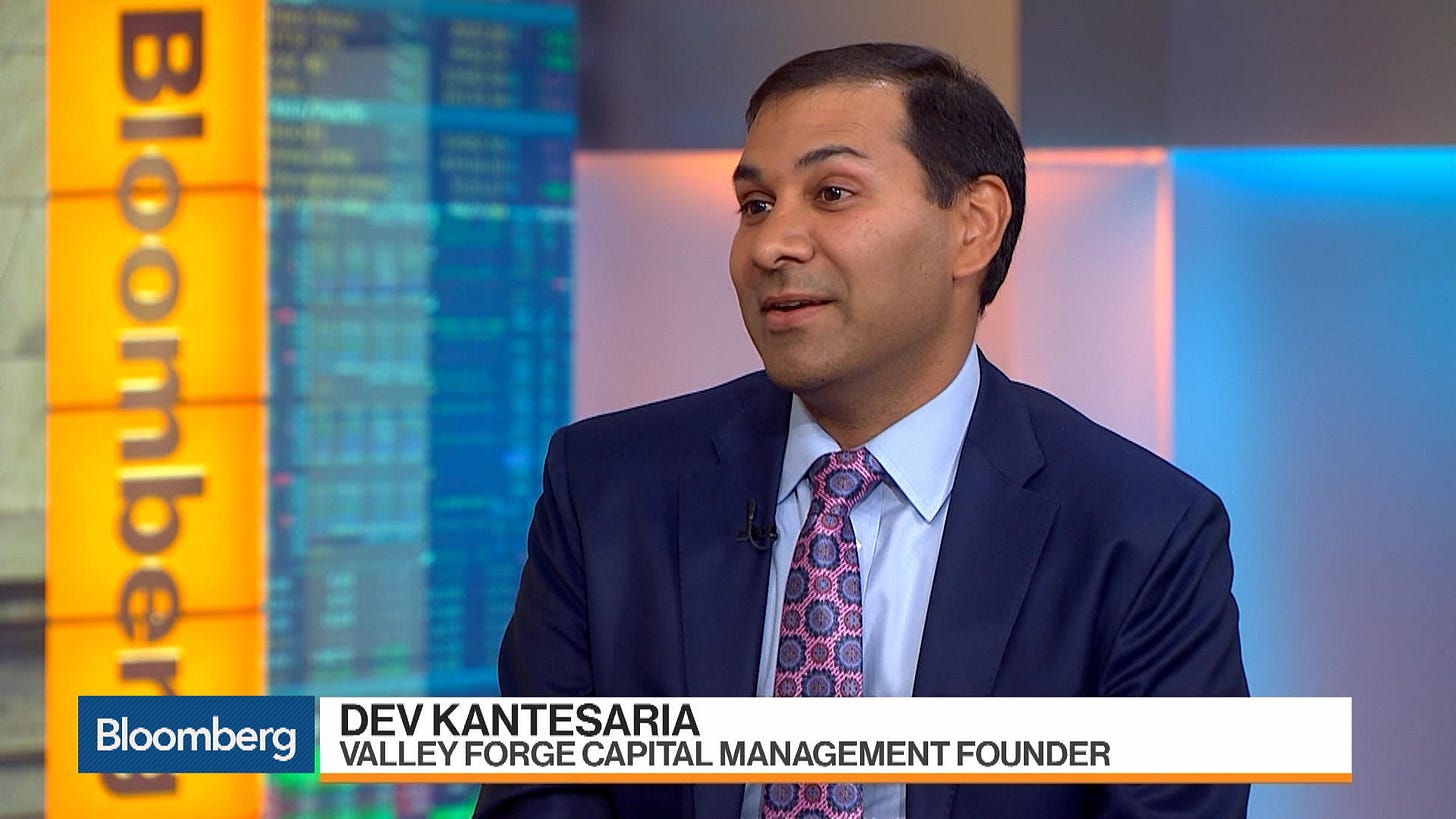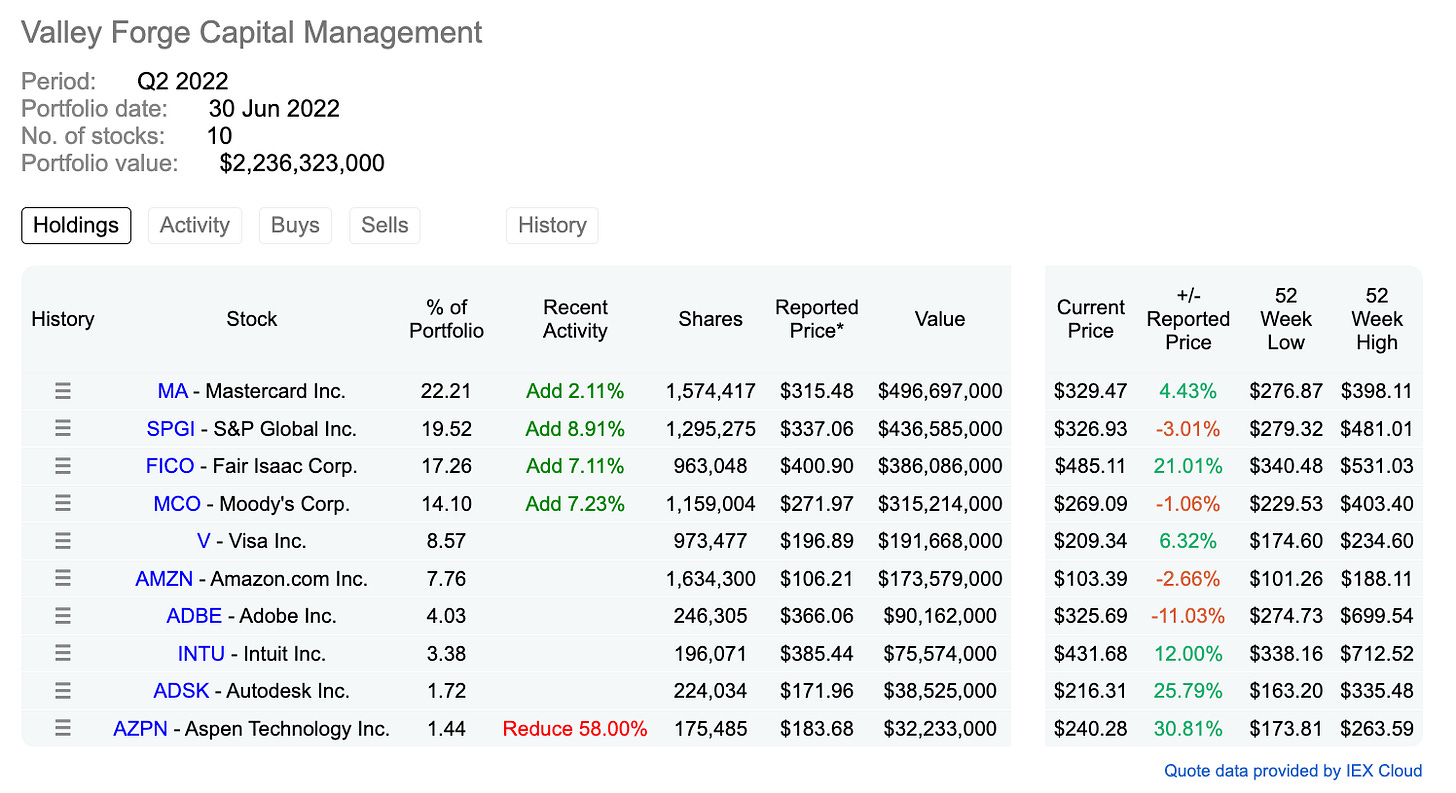10 Lessons Learnt from Dev Kantesaria (Valley Forge Capital Management)
This short article summarises my top 10 learnings from Dev Kantesaria's recent appearance on the "Good Investing Talks" podcast, which was one of the best investor interviews I've listened to.
Introduction
This short article summarises my top 10 learnings from Dev Kantesaria’s appearance on the “Good Investing Talks” podcast in October 2022, which was one of the best investor interviews I’ve ever listened to. It’s a must listen for all aspiring investment professionals.


Dev’s Unique Background
Dev is the Founder/PM at Valley Forge Capital Management and has one of the most impressive and varied professional backgrounds I’ve come across:
Undergraduate degree from MIT.
Graduated top of his class at Harvard Medical School (and is therefore a trained medical doctor).
Worked for two years at McKinsey & Company.
Worked for 18 years in VC.
Founded Valley Forge in 2007 with $300k AUM.
Valley Forge’s Current Portfolio
At Valley Forge, Dev runs a long-only concentrated portfolio of 8-12 “quality growth” companies (otherwise known colloquially as “compounders”). As of Q2 2022, Valley Forge had $2.2b AUM. I’ve attached a screenshot of his portfolio below (source: Dataroma). At a high-level, there seem to be two buckets in his portfolio:
Larger positions (>8%) - large-cap monopoly/oligopoly financial services businesses with strong network effects (e.g., Mastercard and S&P Global).
Smaller positions (<8%) - large-cap software businesses (note: only applies to the AWS component of Amazon) with high switching costs (e.g., Adobe and Intuit).
The 10 Lessons
Here are my top 10 learnings from Dev’s interview:
Investment Framework
Dev looks for companies that can very predictably grow earnings/FCF over time, ideally as consistently as possible.
In his previous career as a VC, Dev looked for companies undergoing a “step change” in business trajectory, but at Valley Forge, he looks for businesses with a long track-record of “demonstrated excellence”.
An illustrative quote from Dev - “if you are worried about next quarter’s results, then you are likely in a business with too low predictability.”
Across the fund life of Valley Forge, investments in foreign countries outside the US have required the most research and generated the poorest returns. As a result, Valley Forge’s current portfolio consists only of US-listed companies.
Valley Forge’s investment edge (i.e., “alpha”) comes from their patient temperament and being acutely focused on the long-term.
While many investors claim to be focused on the long-term, Valley Forge’s low portfolio turnover is proof in the pudding; the 10 companies they owned at the end of Q2 2022 were the same 10 companies they owned at the end of Q2 2020, despite a COVID-19 pandemic, global macroeconomic slowdown, and escalating geopolitical conflict.
Often, the best investment decision to make is to “just sit down and do nothing.”
Business Quality
Dev uses such stringent criteria to assess business “quality” that only approx. 50 companies worldwide are eligible for inclusion into the Valley Forge portfolio. The main determinant of whether one of these 50 watch-list companies makes it into the final portfolio is price/valuation.
Dev appraises business quality using the following indicators:
Strong and consistent organic growth rates (both in revenue and earnings/FCF).
Mission-critical service/product (where the customer would become much less productive or not be able to function without the product/service).
Strong pricing power (being able to raise prices on customers with little to no increase in churn).
Capital-light business model (no large fixed costs to build infrastructure or need for constant R&D to generate revenue, e.g., in pharmaceutical businesses).
Strong operating leverage (where earnings/FCF growth consistently outpaces revenue growth).
Disciplined capital allocation (management making prudent financial decisions, e.g., value-accretive acquisitions or returning capital to shareholders).
An investor should never sacrifice business quality for a seemingly “cheap” valuation.
Management
Management is arguably the most important consideration when making early-stage VC investments, but becomes much less important when investing in established large-cap businesses with strong competitive advantages.
As evidence of this belief, none of Valley Forge’s 10 portfolio companies are founder-led, a stark contrast to the approach of most concentrated fund managers who heavily favour founder-led businesses.
Financial Modelling
Dev accounts for stock-based compensation (SBC) and future dilution from options/warrants in their DCF models. He also does not underwrite any future optionality (e.g., revenue/earnings/FCF generated from new business endeavours) in their DCF models.
Dev uses the 10-year US treasury yield as the “risk-free rate” in his DCF models.
Generating Wealth
Investing in the public markets is the most reliable route to generating long-term wealth and offers a better meritocracy than private markets because all investors have access to the same companies (e.g., a “level playing field”).
In contrast, success in private market investing (e.g., VC, PE), in addition to fundamental analysis, is also based on “who you know” and having access to the best deals/companies.
Best,
Jordan



